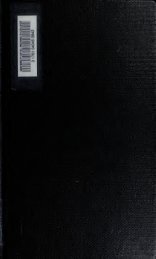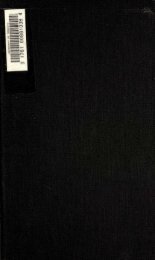Texts from the Buddhist canon : commonly known as Dhammapada
Texts from the Buddhist canon : commonly known as Dhammapada
Texts from the Buddhist canon : commonly known as Dhammapada
You also want an ePaper? Increase the reach of your titles
YUMPU automatically turns print PDFs into web optimized ePapers that Google loves.
FLOWERS. 75<br />
But <strong>the</strong>re are two things in <strong>the</strong> -world' wiich are immutably<br />
fixed—that good actions bring happiness, and<br />
bad actions result in misery. But (it is not generally<br />
<strong>known</strong> that) <strong>the</strong> joys of heaven <strong>as</strong> well <strong>as</strong> <strong>the</strong> sorrows<br />
of earth are both to be avoided. Who, <strong>the</strong>n, is able to<br />
pluck and to hold <strong>the</strong> true joy of perfect rest (<strong>the</strong> rest of<br />
non-action) ? Truly ye have understanding, women !<br />
and <strong>the</strong>refore he recited <strong>the</strong>se gath<strong>as</strong><br />
" Who is able to select (conquer ?) ^ <strong>the</strong> earth (i.e.,<br />
<strong>the</strong> place of his abode), to escape Yama/ and lay<br />
bold of heaven ? Who (is able) to repeat <strong>the</strong> verses<br />
of <strong>the</strong> Law <strong>as</strong> one who selects choice (excellent)<br />
flowers ? The enlightened (one) selects <strong>the</strong> earth,<br />
avoids Yama, seizes heaven, illustriously repeats<br />
<strong>the</strong> verses of <strong>the</strong> Law, is able to cull <strong>the</strong> flowers of<br />
virtue. Knowing that <strong>the</strong> world is like a hillock of<br />
sand,' that it is unsubstantial <strong>as</strong> a mirage, he sepa-<br />
rates <strong>the</strong> flowery arrows of M^ra,* and escapes <strong>from</strong><br />
<strong>the</strong> necessity of birth and death.* !Regarding <strong>the</strong><br />
body <strong>as</strong> a bubble, <strong>as</strong> a self-created mirage, he sepa-<br />
rates <strong>the</strong> flowery garland of Mara, and escapes <strong>from</strong><br />
birth and death."<br />
And so <strong>the</strong> 500 women were converted, and, in reply to<br />
Ananda, Buddha explains how <strong>the</strong>se women had formerly<br />
lived in <strong>the</strong> time of K^^yapa Buddha, and because of <strong>the</strong>ir<br />
devotion to him, were now privileged to live in <strong>the</strong> time<br />
of ^§,kya Buddha, and to be converted by him. And so on<br />
ano<strong>the</strong>r occ<strong>as</strong>ion Buddha recited <strong>the</strong>se g&th<strong>as</strong> :<br />
1 This is expressed by a difficult (<strong>as</strong> a proper uame) except by <strong>the</strong><br />
p<strong>as</strong>sage. The Chinese Udh means P&li translation.<br />
" to select " or " pick out," and <strong>the</strong> 3 Ljig "froth " (Pffi), v. 46.<br />
whole Terse seems to allude to choos- * Instead of /oo I hare been obliged<br />
ing " a future abode " (bhfuni). to substitute *sin, an arrow.<br />
" The expression "lam" in Chinese ^ Probably <strong>the</strong> word simg is a miscould<br />
hardly have been understood take for wows', "King of Death."<br />
:<br />
"





